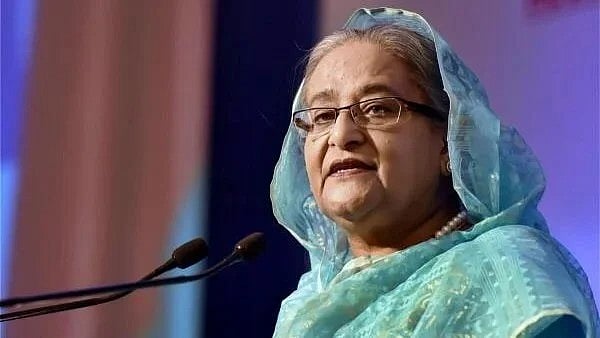
Ousted Bangladesh Prime Minister Sheikh Hasina.
Credit: PTI Photo
Following the death sentence pronounced by the International Crimes Tribunal (ICT) to former Prime Minister Sheikh Hasina, Bangladesh’s interim government has cited the India–Bangladesh Extradition Treaty (2013) for the return of the ousted leader.
An arrest warrant has been issued against Hasina by the ICT for “crimes against humanity." However, a question remains whether India is legally obliged to facilitate the return as per India-Bangladesh Extradition Treaty (2013).
It depends on intricate treaty provisions, exceptions, and India’s domestic law.
When is an extradition request valid and what are Articles 1 & 2?
According to the India-Bangladesh extradition treaty, a request can be made if the individual has been charged, accused, or convicted of an extraditable offence. In this case, the ICT has issued an arrest warrant and a death penalty in connection with “crimes against humanity.”
Legally, this comes under the minimum procedural condition required for Bangladesh to transmit an extradition request to India, which they already have.
However, Articles 1 and 2 call for dual criminality, which means that the alleged offence must be punishable under the laws of both countries.
"Crimes against Humanity" is recognised under the Bangladeshi domestic law but India interprets it differently in the context of international tribunals rather than domestic political events.
This provides India a chance to argue that the charged offence does not fit the definition required for extradition under its own legal system.
What are Articles 6(1) and 8(3)?
The most significant clauses in the treaty in Hasina's case are Article 6(1) and Article 8(3).
Article 6(1) provides an explicit exception that could mean that the ousted leader can remain in India. The exception states that extradition may be refused if the alleged offence is considered an "offence of a political character.”
It is important to note that Hasina was removed by a political uprising and replaced a Muhammad Yunus-led interim government. This means that India can argue that the accusations, trial, and verdict are inseparable from Bangladesh’s political situation.
Further, Article 8(3) strengthens Article 6(1) by stating that extradition can be denied if the request is not made in good faith or not in the interests of justice.
Since the Yunus administration is a political opponent of Hasina, India has the option of citing this clause to claim that the charges appear politically motivated.
However, if India argues citing these Articles, Bangladesh may attempt to invoke Article 6(2), which provides an exception to the political-offence bar. For this to succeed internationally or diplomatically, Dhaka needs to prove that the charges were brought in good faith.
Can the UN or other international body interfere?
Since it is a bilateral treaty signed between two sides, no neutral mechanism can interfere or make amends to the treaty. The United Nations cannot intervene in the implementation of a bilateral extradition agreement, while the International Court of Justice (ICJ) can only hear cases with the consent of both governments.
However, the treaty includes an escape clause in Article 21(3) which allows either country to terminate the treaty with six months’ notice.
What does India's extradition laws say?
Apart from the treaty, India’s own Extradition Act, 1962 provides several legal barriers to surrendering individuals charged in politically sensitive cases. Section 31 deals with the 'political offence' exception.
The clause says that a fugitive shall not be surrendered if the alleged offence is of a political character. Since Hasina’s removal, trial, and conviction follow a domestic political uprising, India can easily categorise the accusation as political.
Further, Section 29 talks about lack of good faith or interests of justice.
This provision allows India to reject extradition if the request appears not made in good faith, not in the interests of justice, or politically motivated. These terms are similar to Articles 6 and 8 of the bilateral treaty.
History of India-Bangladesh extradition treaty
The treaty was primarily formed with two purposes. Bangladesh always wanted to unearth the unresolved crimes from the 1971 Liberation War, while India wanted to ensure the return of militants such as ULFA leaders who were hiding across the border.
